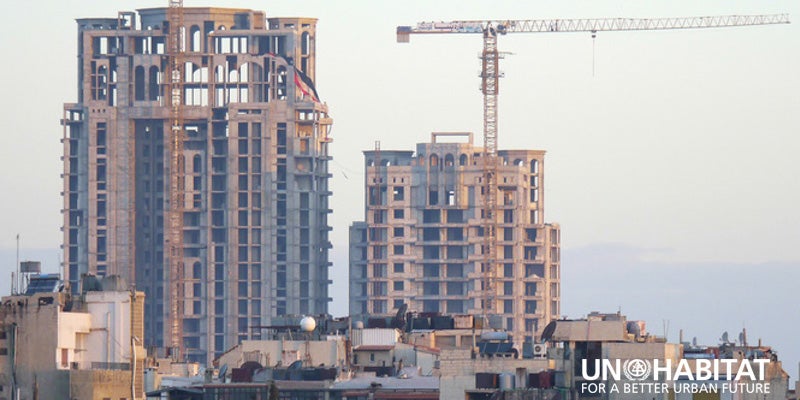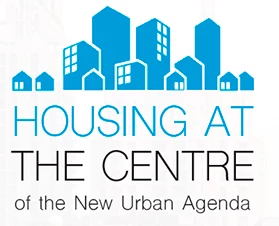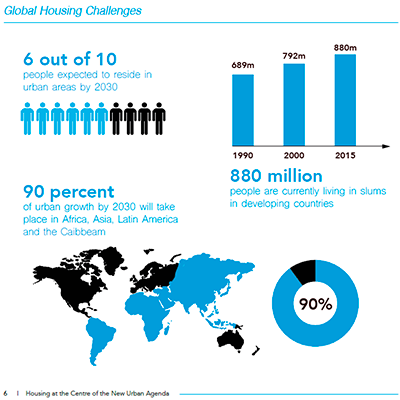
Clearly, a lot of what has gone wrong with cities is related in one way or another to housing. The future of urbanization will therefore depend on how countries and cities position housing as a priority in the public debate around sustainable development.
From slums to gated communities, from overcrowding to sprawl, from homelessness to the vacant houses, there is much evidence that housing is shaping cities worldwide, regretfully, in many cases, by producing fragmentation and inequalities. The resulting models are leading to social, environmental and financial costs far beyond what the majority of cities can afford.

We cannot overlook this reality. This is why, towards Habitat III, UN-Habitat has increased efforts to re-establish housing as a priority in the debate around sustainable urbanization. We are proposing the 'Housing at the Centre' approach to shift the focus from simply building houses to a holistic framework where housing is orchestrated with national and urban development in a way that benefits all people.
Why Do We Need Housing at the Center?

The growing urgency to provide adequate housing to millions of households and the need to do so in ways to guarantee a sustainable future for cities calls for a paradigm shift in housing policy and practice.
The momentum could not be better with the Sustainable Development Goal 11 to “make cities and human settlements inclusive, safe, resilient and sustainable” and targets to ensure access for all to adequate, safe and affordable housing and basic services and upgrade slums. There is no doubt the 2030 SDGs are ambitious. However, to make them a reality we must think innovatively about inclusive approaches to providing housing and addressing the challenges of affordability.
It is a reality that the majority of people in need of housing are poor and they continue addressing their housing needs by themselves, incrementally and often informally. We need to encourage innovative and more inclusive housing finance systems including through incentives to housing finance providers who lend to low-income groups and alternative financial institutions for low-cost housing. We need to promote new approaches to tenure, collateralization and guarantee mechanisms as well as financial products that are adapted to gradual building processes.
The future of cities depends on how well and how soon access to adequate housing will be provided for all . Positioning housing at the center of national and local urban agendas will be instrumental for achieving this goal and promoting inclusion and equality of opportunities in the urban development process. In order to place housing at the center, some of the fundamental guiding principles should be considered:
- Housing is inseparable from urbanization at the same time as it is a an integrating element of urban planning
- Systemic reforms, strong states and long-term policy and finance are needed to enable access to adequate housing for all.
- Housing and slum upgrading policies should be accompanied by national strategies with a detailed plan of action, time frame, and provisions for ensuring that resources are available to implement
- Place matters and urbanization will not be inclusive without providing access to housing, services and livelihood for all.
- Human rights principles and standards are of outstanding relevance for urban development to lead to socially sustainable and inclusive cities.
Implementing Housing at the Centre on the ground is the next and most important step. What comes next, towards materializing this approach, should be the result of a collective commitment to promoting the progressive realization of the right to adequate housing and building a future where cities will be places of opportunities for all.
Today, 1.2 billion people live in substandard housing and by 2030 almost 3 billion people will need new housing. The 7th Global Housing Finance conference, which took place in May 2016, focused on finding solutions to make housing more affordable to all. We invited our partners to share their ideas on how to ensure access for all to adequate, safe and affordable housing and basic services. This contribution comes from UN-Habitat. Learn more about the UN-Habitat’s Housing at the Centre.


Join the Conversation